Introduction to PHP Web Development
A course by Ignacio Cruz Moreno , Web Developer

Learn to code with the most popular language used by content manager systems
Web development brings together a growing number of programming languages, but there are few that have stood the test of time like HTML, CSS, and JavaScript. This is also the case for PHP, a language that dates back to 1995 and that remains the most widely used programming language by content management systems such as WordPress, Joomla, and Drupal.
In this online course, learn the basics of programming in PHP and create a small CMS to get started with this fascinating language together with Ignacio Cruz Moreno, a developer specialized in WordPress.
If you've already taken Ignacio's first course, Creation of a Professional Website with WordPress, it's now time to take it a step further and create your own platform to suit your needs.
What will you learn in this online course?
26 lessons & 27 downloads
- 99% positive reviews (293)
- 11,847 students
- 26 lessons (4h 12m)
- 27 additional resources (1 files)
- Online and at your own pace
- Available on the app
- Audio: Spanish, English, French, Italian, Portuguese, Turkish
- Spanish · English · Portuguese · German · French · Italian · Polish · Dutch · Turkish · Romanian · Indonesian
- Level: Intermediate
- Unlimited access forever
What is this course's project?
Create a small content manager system featuring a website that allows you to create blog posts, complete with a login system and connection to a database.
Projects by course students
Who is this online course for?
Anyone who wants to learn to develop web pages with PHP.
Requirements and materials
You need basic knowledge of HTML and CSS as well as a computer and a code editing software.

Reviews

Ignacio Cruz Moreno
A course by Ignacio Cruz Moreno
Ignacio Cruz is a web developer specialized in WordPress. He works for WPMU DEV and develops plug-ins and themes for Edublogs.
He is very involved in the WordPress community, devoting part of his time to fixing bugs and proposing improvements, and is also a co-organizer of the WordPress Madrid Meetup.
Content
-
U1
Introduction
-
Presentation
-
Influences
-
-
U2
Introduction to PHP
-
What is PHP and how does it work?
-
Installing a local environment
-
PHP syntax and our first script
-
-
U3
Preparation of the project
-
Structure of the project
-
Variables, constants and functions
-
Purged of errors
-
-
U4
Showing user entries
-
Type of data
-
Loops Iterating to show the entries
-
Dates in PHP
-
Superglobal variables
-
Control structures and operators: Showing a single post to the user
-
-
U5
Files and forms
-
Include files in PHP: Time to reorganize
-
Forms: Creating posts on the blog
-
-
U6
Databases
-
Introduction to MySQL and Databases
-
MySQL integration in our project
-
Saving data in the Database
-
Redirects and headers
-
Redirects and headers II
-
-
U7
PHP beyond the basics
-
Basic security
-
Login through session system
-
A front controller for our CMS
-
Classes and Objects
-
Frameworks and CMS in PHP
-
How to upload our code
-
-
FP
Final project
-
Introduction to PHP
-
What to expect from a Domestika course
-
Learn at your own pace
Enjoy learning from home without a set schedule and with an easy-to-follow method. You set your own pace.
-
Learn from the best professionals
Learn valuable methods and techniques explained by top experts in the creative sector.
-
Meet expert teachers
Each expert teaches what they do best, with clear guidelines, true passion, and professional insight in every lesson.
-
Certificates
PlusIf you're a Plus member, get a custom certificate signed by your teacher for every course. Share it on your portfolio, social media, or wherever you like.
-
Get front-row seats
Videos of the highest quality, so you don't miss a single detail. With unlimited access, you can watch them as many times as you need to perfect your technique.
-
Share knowledge and ideas
Ask questions, request feedback, or offer solutions. Share your learning experience with other students in the community who are as passionate about creativity as you are.
-
Connect with a global creative community
The community is home to millions of people from around the world who are curious and passionate about exploring and expressing their creativity.
-
Watch professionally produced courses
Domestika curates its teacher roster and produces every course in-house to ensure a high-quality online learning experience.
FAQs
What are Domestika's online courses?
Domestika courses are online classes that allow you to learn new skills and create incredible projects. All our courses include the opportunity to share your work with other students and/or teachers, creating an active learning community. We offer different formats:
Original Courses: Complete classes that combine videos, texts, and educational materials to complete a specific project from start to finish.
Basics Courses: Specialized training where you master specific software tools step by step.
Specialization Courses: Learning paths with various expert teachers on the same topic, perfect for becoming a specialist by learning from different approaches.
Guided Courses: Practical experiences ideal for directly acquiring specific skills.
Intensive Courses (Deep Dives): New creative processes based on artificial intelligence tools in an accessible format for in-depth and dynamic understanding.
When do the courses start and when do they finish?
All courses are 100% online, so once they're published, courses start and finish whenever you want. You set the pace of the class. You can go back to review what interests you most and skip what you already know, ask questions, answer questions, share your projects, and more.
What do Domestika's courses include?
The courses are divided into different units. Each one includes lessons, informational text, tasks, and practice exercises to help you carry out your project step by step, with additional complementary resources and downloads. You'll also have access to an exclusive forum where you can interact with the teacher and with other students, as well as share your work and your course project, creating a community around the course.
Have you been given a course?
You can redeem the course you received by accessing the redeeming page and entering your gift code.


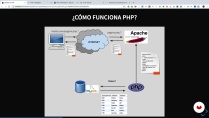

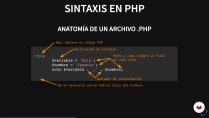
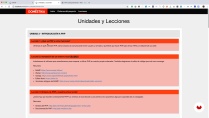
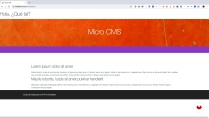
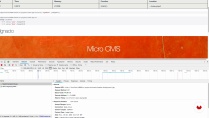


El curso te lleva de cero a una comprensión del lenguajePHP y a su uso principal en la web, bien explicado por el profesor que es un crack.
ce que je remarque sur ce que cour c'est pas pour debutant du coup c'est pas facile le melange d'espagnol et du français pas tres coherant j'ai acheté ce cour pour plus de comprehension mais helas
Gran profesor! me encanta el aporte que da, de experiencia y humildad. Hacen que sus cursos enganchen y aprendas.
buena explicación :)
6/10